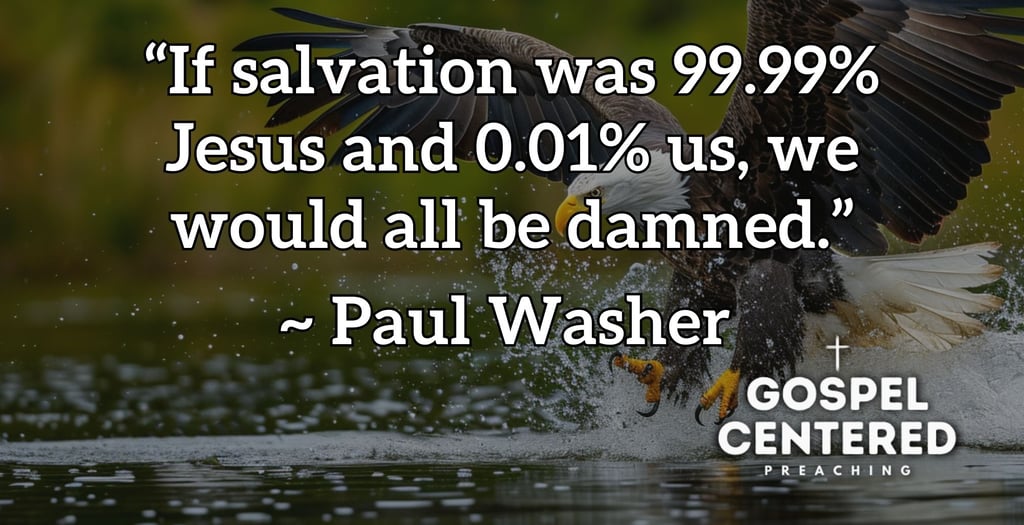Salvation is by Grace Alone
This blog post delves into the theological truth that salvation is entirely the work of Jesus Christ, emphasizing that even the slightest human contribution undermines the completeness of His grace, and explores the implications of this truth for Christian living and faith.
THEOLOGICAL ARTICLES
Justin Hoke
1/13/20243 min read


In the vast expanse of Christian theology, there lies a profound truth, often understated yet pivotal to our understanding of salvation. It's the concept that salvation is not a joint venture between humanity and divinity but an exclusive work of God's grace, through Jesus Christ. This idea, though simple, carries weighty implications for our faith and daily walk with God.
The Undiluted Grace of God
The Bible, in its unerring wisdom, presents salvation as an act of grace, entirely independent of human effort. Ephesians 2:8-9 (NKJV) states, "For by grace you have been saved through faith, and that not of yourselves; it is the gift of God, not of works, lest anyone should boast." This passage illuminates the fundamental truth that salvation is a gift, unearned and unmerited. The notion that even a fraction of our salvation depends on us undermines the completeness of Christ's work on the cross. It's either all of Jesus or none at all.
The Fallacy of Human Contribution
Consider the human heart, with its propensity to pride and self-reliance. If our salvation hinged even minutely on our efforts, it would inevitably lead to boasting and self-glorification. Romans 3:23-24 counters this by declaring, "For all have sinned and fall short of the glory of God, being justified freely by His grace through the redemption that is in Christ Jesus." Our universal fallibility underscores our utter reliance on God's grace for salvation.
The Fullness of Christ's Atonement
The cross of Christ stands as the pinnacle of God's redemptive plan. In Jesus' own words, "It is finished" (John 19:30), we find the totality of salvation's work. These words signify the completion of a transaction, the full payment of a debt we could never hope to settle. 1 Peter 2:24 reinforces this, stating, "who Himself bore our sins in His own body on the tree, that we, having died to sins, might live for righteousness—by whose stripes you were healed." The healing power of His sacrifice leaves no room for human addition.
The Danger of Diluted Belief
When we entertain the idea that our actions could contribute to our salvation, even in the smallest measure, we tread on dangerous theological ground. This perspective, often rooted in a misunderstanding of faith and works, can lead to a legalistic and performance-based approach to Christianity. James 2:26 reminds us, "For as the body without the spirit is dead, so faith without works is dead also." However, these works are not the cause of salvation but the evidence of a faith already alive in Christ.
The Assurance in Christ Alone
The assurance of salvation lies not in our fluctuating faithfulness but in the steadfast nature of God's promise in Christ. Romans 8:1 reassures us, "There is therefore now no condemnation to those who are in Christ Jesus." In Him, we find a harbor of certainty in the turbulent seas of life's trials and our own failures. Our confidence is not in our ability to hold onto Christ, but in His unyielding grip on us.
Living in the Freedom of Grace
Understanding the fullness of grace compels us to live in gratitude and humility. It's a life marked not by a casual attitude towards sin, but by a deeper appreciation for the cost of our redemption and a more profound love for our Savior. Titus 2:11-12 instructs us, "For the grace of God that brings salvation has appeared to all men, teaching us that, denying ungodliness and worldly lusts, we should live soberly, righteously, and godly in the present age."
For Further Study
All of Grace by Charles Haddon Spurgeon
Saved by Grace Alone by D. Martyn Lloyd-Jones
Putting Amazing Back into Grace by Michael Horton
